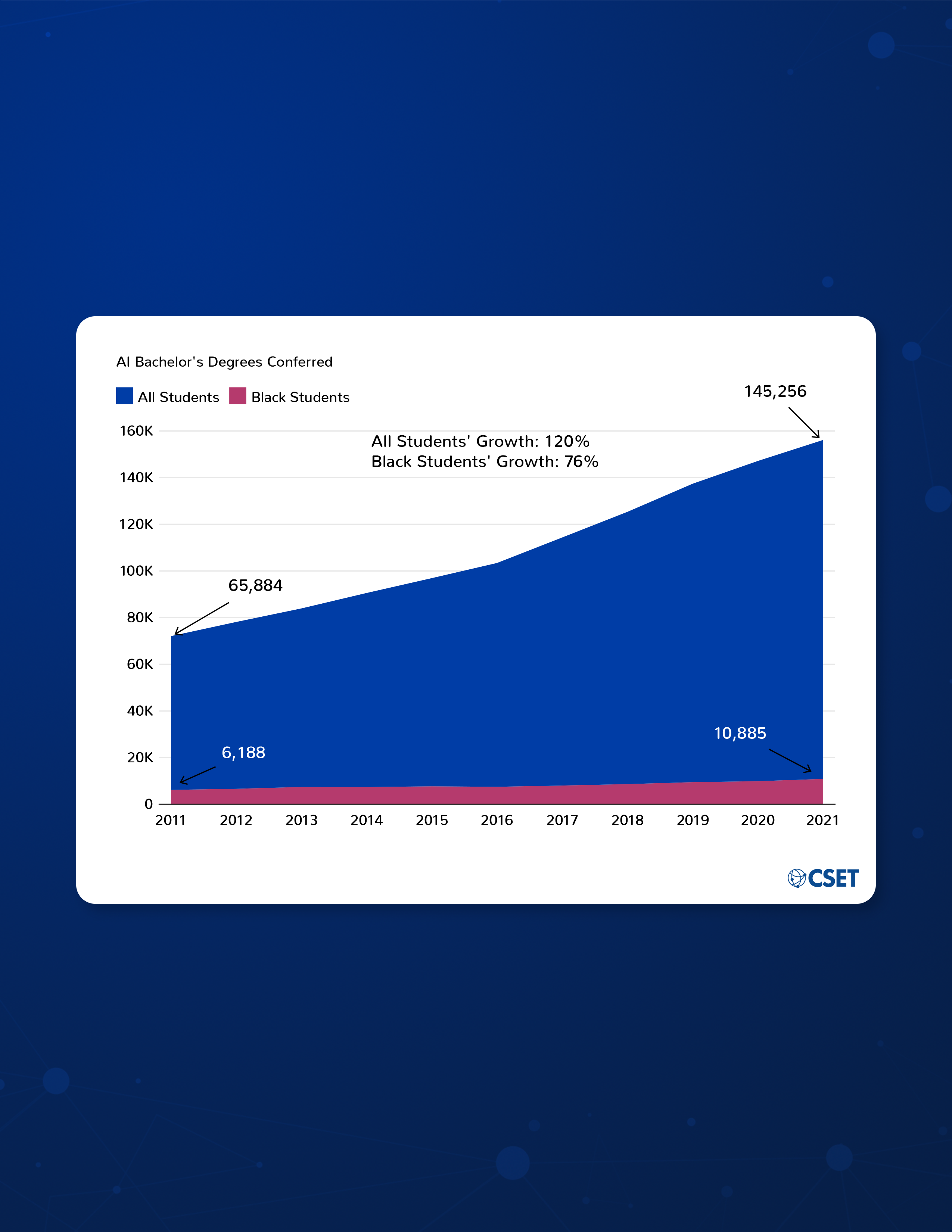Thus far, we’ve examined U.S. AI-related degree conferrals, pre-baccalaureate credentials, and postsecondary AI education gender disparities. This fourth snapshot in CSET’s Education series examines the proportion of Black students who earn AI-related degrees at the bachelor’s, master’s, and PhD levels.
Consistent with our previous snapshots, this one uses Integrated Postsecondary Education Data System (IPEDS) data and considers computer science, bioinformatics, computer and electrical engineering, nanotechnology, and cybersecurity majors to be “AI-related.” Note that we only include government data wherein respondents self-identified as Black; this may exclude some mixed-race students who did not also explicitly self-identify as Black.
This analysis examines the proportion of Black students earning AI-related degrees as a share of all conferred AI-related degrees in the United States, using STEM and overall degree conferrals as comparisons. When reviewing Black students’ representation in postsecondary degrees, keep in mind that Black Americans comprise more than 14 percent of the U.S. population.1
Overall, we find that while AI-related degree conferrals for Black students are relatively low in comparison to the general student population, Black students’ AI-related degree growth is high, especially at the graduate level.
Black Students’ Bachelor’s Degree Representation
Black students’ degree conferrals overall and in STEM have increased in absolute numbers over the past decade. The national growth rate for all STEM bachelor’s degree conferrals and Blacks students’ bachelor’s degree conferrals are approximately the same; STEM bachelor’s degrees conferrals grew 75 percent between 2011 and 2021 (Figure 1).2
Similarly, all-subject bachelor’s degree growth was comparable to Black students’ all-subject bachelor’s degree growth at 20–24 percent (Figure 1).
Figure 1. Growth in Black and All U.S. STEM and All-Subject Bachelor’s Degree Conferrals
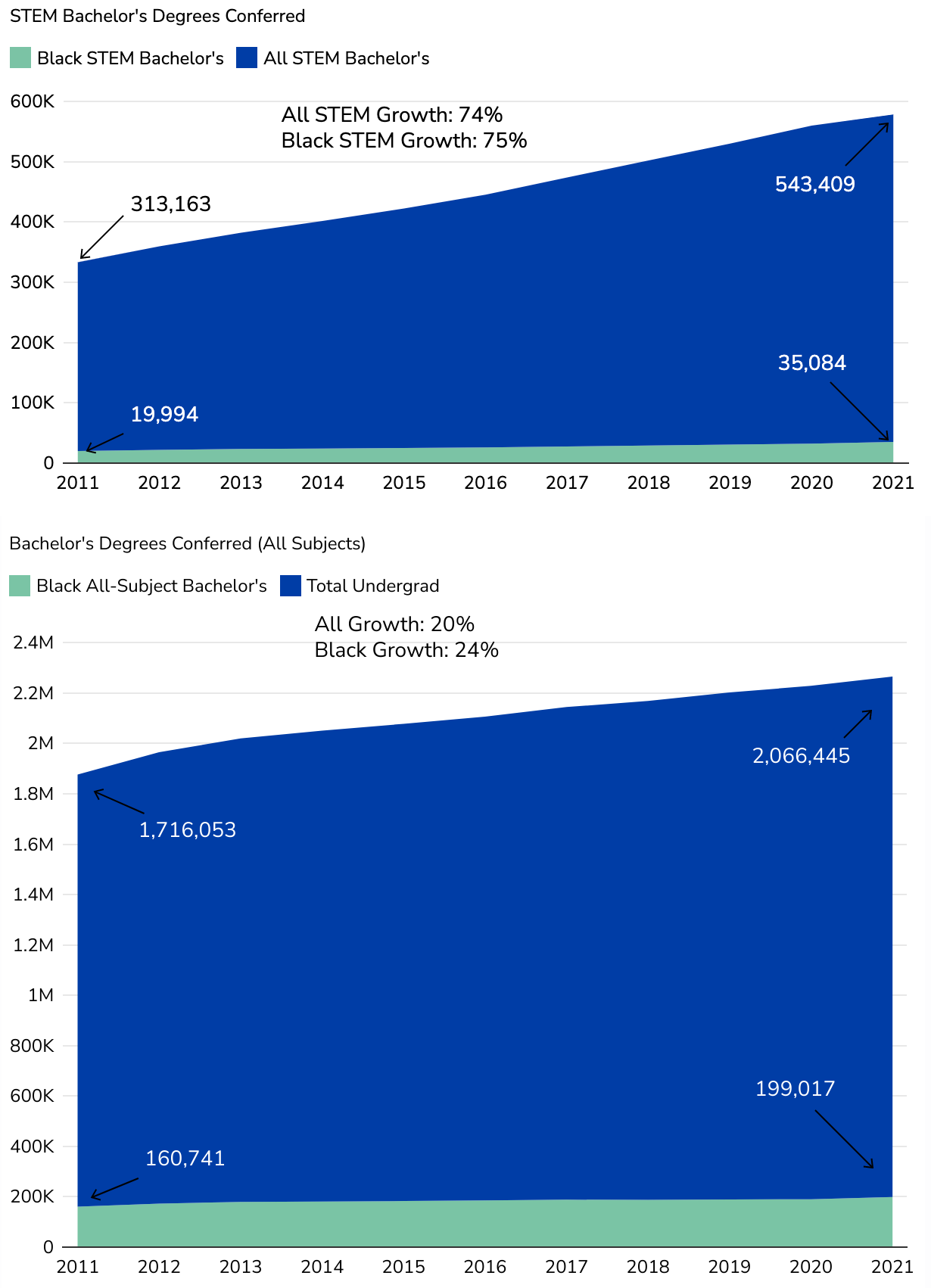
Black bachelor’s degree conferrals in AI-related fields have increased in absolute numbers over the past decade (Figure 2) and have grown at a similar rate (76 percent) to Black STEM bachelor’s degree conferrals (75 percent). However, Black students’ share of all AI-related bachelor’s degrees (Figure 2) decreased as non-Black students’ AI-related bachelor’s degree conferrals increased dramatically, more than doubling between 2011 and 2021.
This disparity in growth is a divergence from the trends among all students and Black students in all subjects and STEM: while STEM and overall bachelor’s degree conferral growth was similar for all students and Black students, AI-related bachelor’s degree growth was materially lower for Black students (76 percent) than for all students (120 percent).
Figure 2. Trends in Black Students’ AI-Related Bachelor’s Degree Conferrals
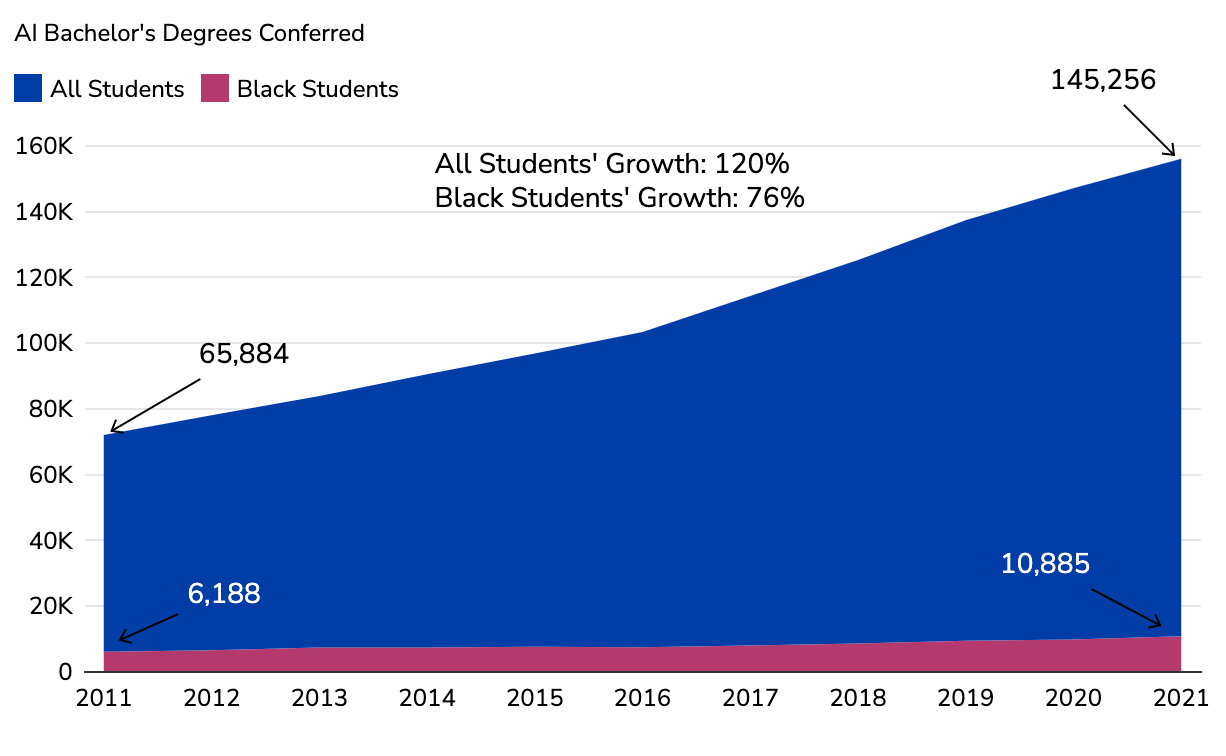
Overall, Black students earn approximately 10 percent of all bachelor’s degrees across all fields; this proportion has held steady since 2011.3 In contrast, Black students comprise 6 percent of all STEM degree conferrals, a trend that has also remained steady over time (Figure 3).4 Below, we visualize Black students’ share of AI-related bachelor’s degrees and find that Black students comprise a slightly larger proportion of AI-related degrees (8 percent) than STEM-related degrees (7 percent), but a smaller proportion than all subjects (10 percent).5 Consistent with the findings above, we found that Black students’ share of AI degrees decreased between 2011 and 2021, down from over 9 percent to 7.5 percent.
Figure 3. Black Students’ Shares of Bachelor’s Degree Conferrals
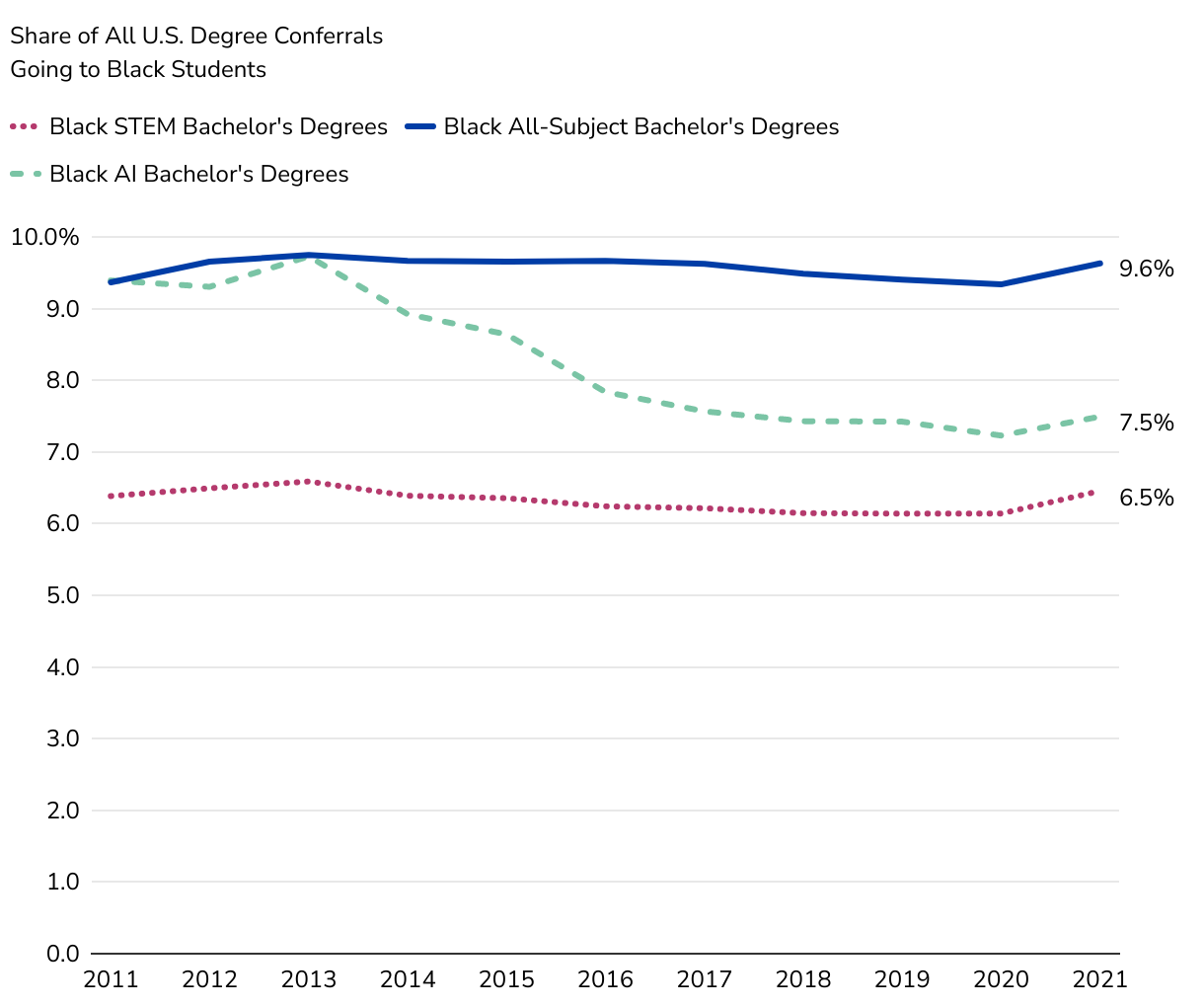
Black Students’ STEM and Overall Graduate (Master’s and PhD) Degrees
Black Students’ Master’s Representation
Black students’ master’s degree conferral rates in STEM and overall grew faster than total students’ master’s degree growth in those categories. Black students’ master’s degree growth in STEM was over 138 percent, compared to 113 percent for all students (Figure 4). STEM master’s growth was much higher between 2011 and 2021 than all-subject master’s degree growth. All STEM master’s degree growth was 19 percent, while Black students’ STEM master’s degree growth was 28 percent over the period studied.
Figure 4. Trends in Black Students’ STEM and All-Subject Master’s Degree Conferrals
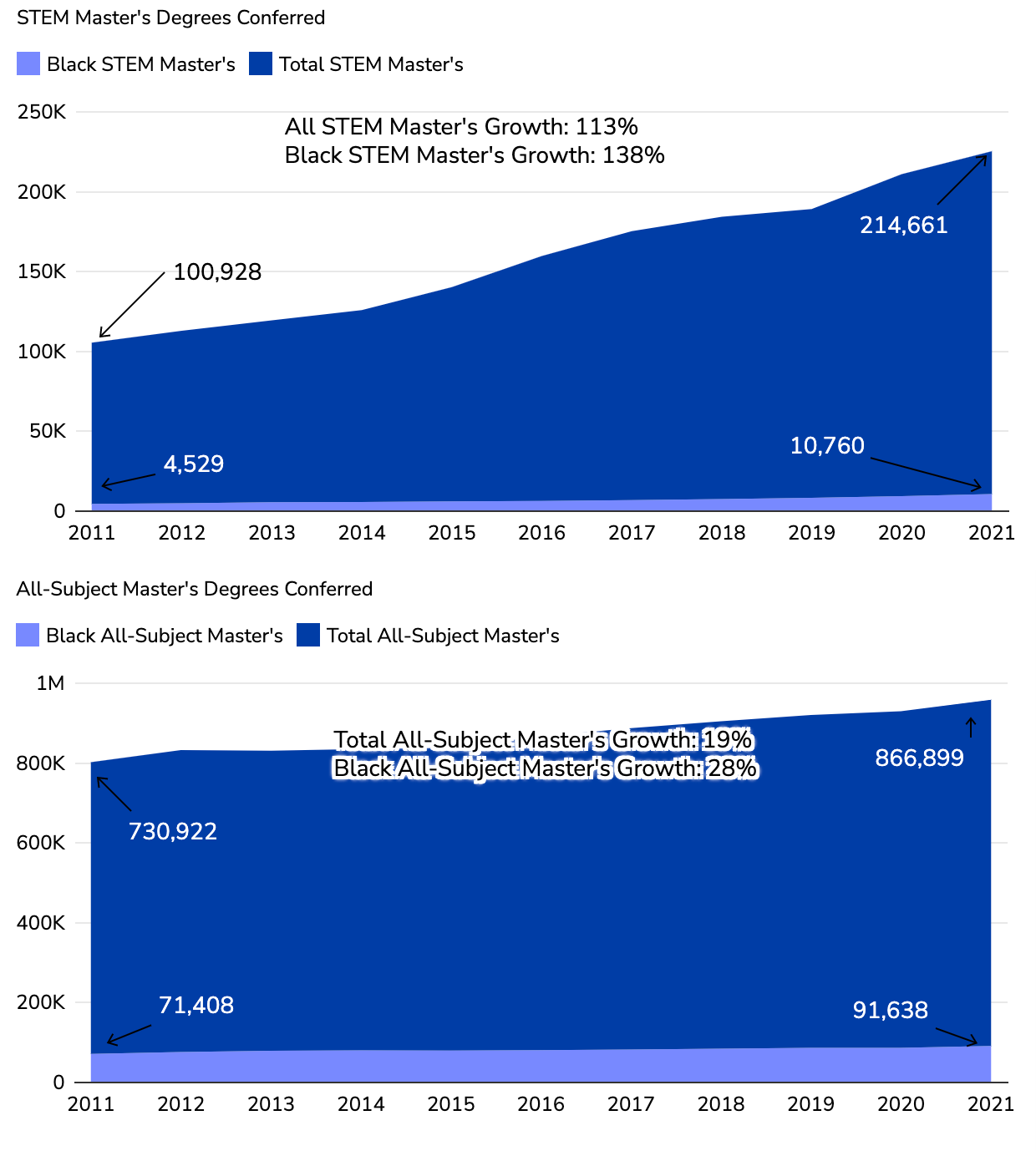
AI-related master’s degree growth closely paralleled STEM master’s degree growth. Black students’ AI-related master’s degree growth (133 percent) was higher than general AI-related master’s degree growth (117 percent), as visualized in Figure 5 below. This pattern is in contrast to Black students’ AI-related bachelor’s degree growth, where Black students’ AI-related degree growth is slower than general AI-related degree growth.
Figure 5. Trends in Black Students’ AI-Related Master’s Degree Conferrals
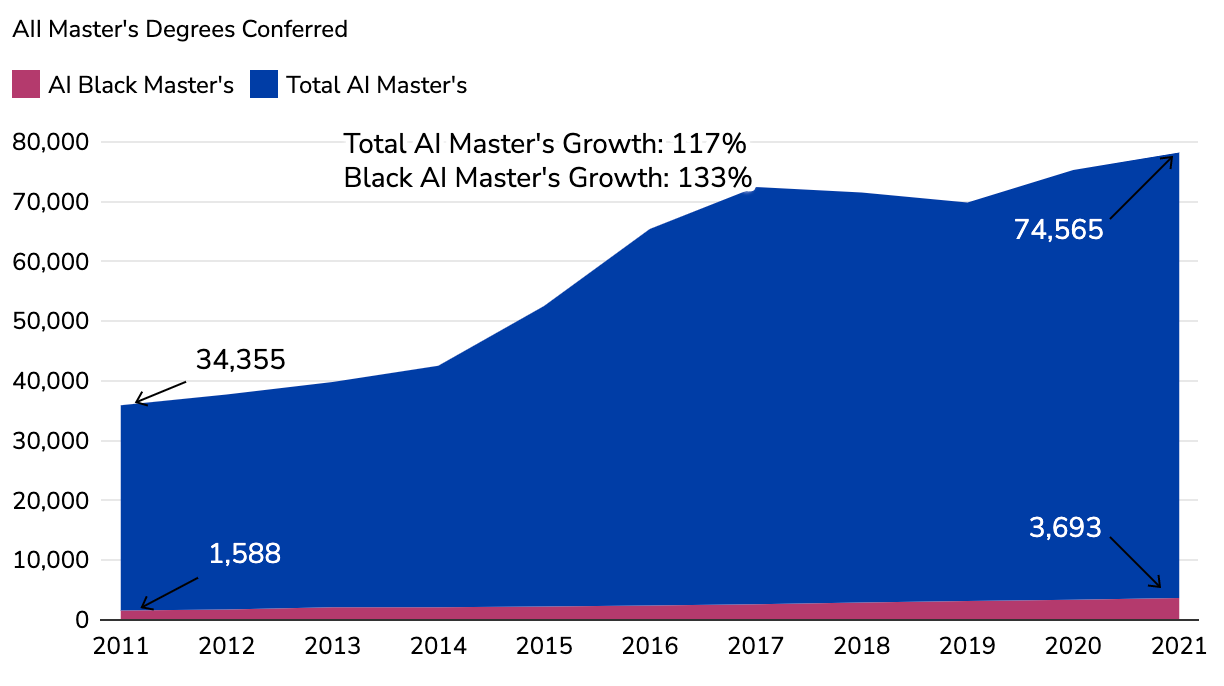
Black Students’ PhDs
Black students’ PhD growth in STEM and overall were higher than general growth. The number of Black students earning PhDs in any subject nearly doubled (89 percent) between 2011 and 2021, increasing from 3,762 to 7,122 PhDs conferred. In contrast, general PhD conferrals increased 22 percent over the same period.
Additionally, Black students’ STEM PhD conferrals increased 40 percent, while total STEM PhD growth increased 26 percent between 2011 and 2021.
Figure 6. Trends in Black Students’ STEM and All-Subject PhD Conferrals
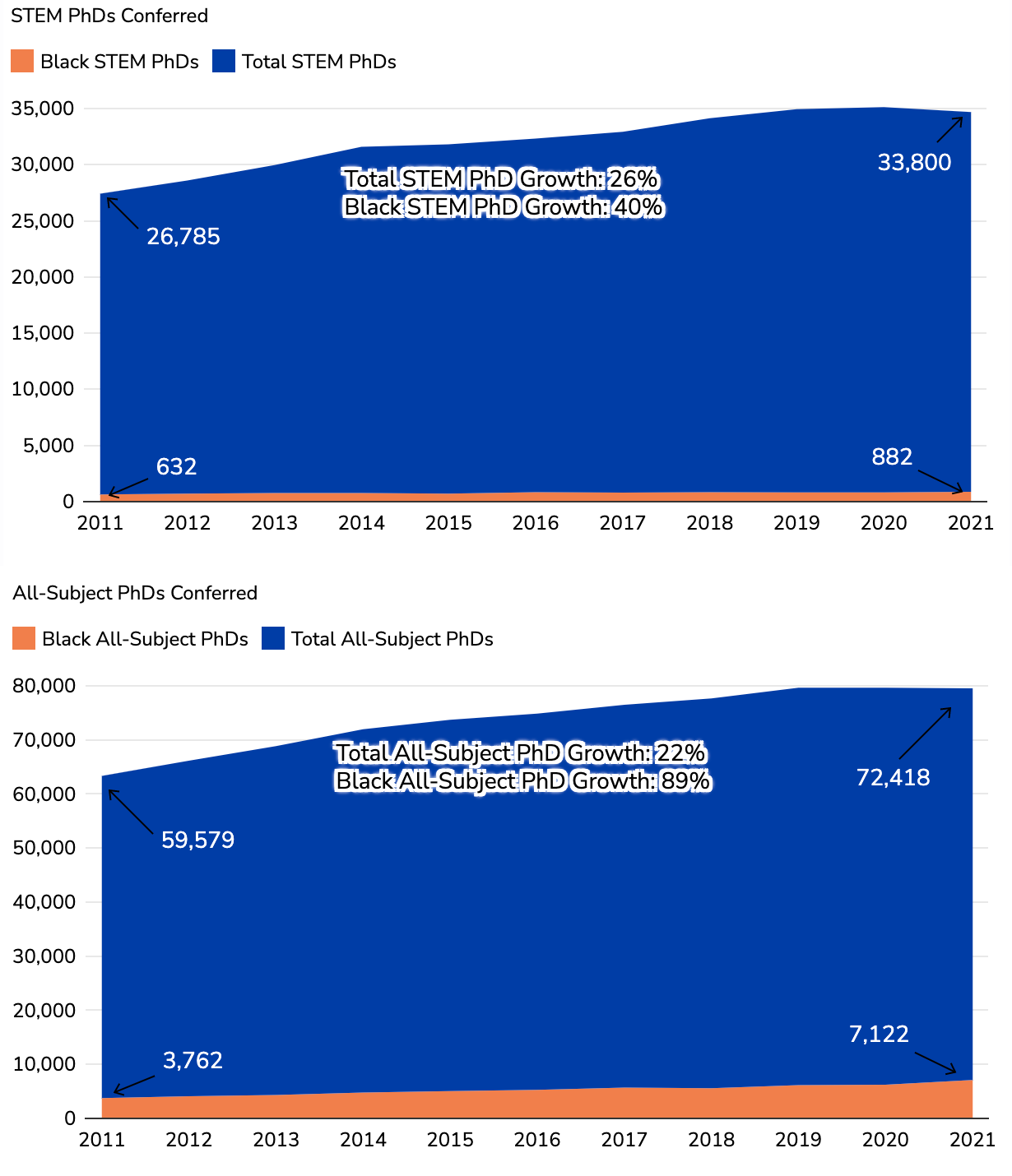
Black students’ annual AI-related PhD conferrals more than doubled between 2011 and 2021, from 76 AI-related PhD conferrals in 2011 to 159 in 2021—a 109 percent increase. Overall AI-related PhD conferral growth was slower, increasing 33 percent over the same time period.
Figure 7. Trends in Black Students’ AI PhD Conferrals
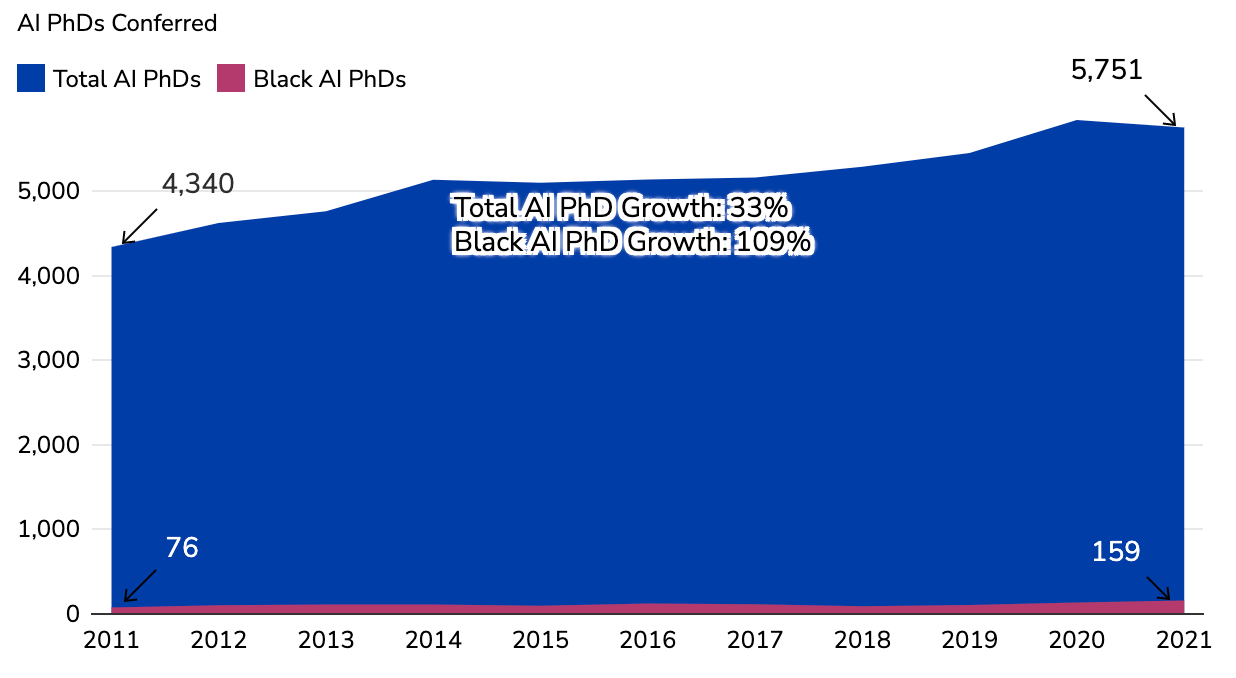
Black Student Representation in Graduate Education
While Black student degree conferrals for all three categories examined grew more quickly than general student degree conferrals at the graduate level, Black students begin from a much smaller student base with more room to expand. Regardless of category—all-subject, STEM, or AI-related—Black students are underrepresented in higher education compared to their proportion of the U.S. population (14 percent). Black students’ graduate representations in STEM and overall, with respect to the overall graduate student populations, are visualized in Figure 8.
Black students’ share of all-subject PhDs increased 56 percent between 2011 and 2021, from 6 percent to just under 10 percent. In contrast, Black students’ all-subject share of master’s degrees remained steady, hovering around 10 percent between 2011 and 2021. Black students’ share of master’s degree attainment is comparable to Black students’ share of bachelors’ degrees.
Consistent with undergraduate degrees, Black students’ share of total graduate STEM degrees is lower than the share for graduate degrees overall. Black students’ share of STEM master’s and PhDs remained steady between 2011 and 2021, around 4–5 percent and 2–3 percent respectively.
Black students’ AI-related master’s degree conferrals increased in absolute numbers from 2011 to 2021, but comprise a steady proportion of total AI-related master’s degrees conferred in that time. 1,588 Black students earned AI-related master’s degrees in 2011, while 3,693 Black students earned such degrees in 2021, representing roughly 5 percent of AI-related master’s degrees conferred at both points.
Figure 8. Black Students’ Share of AI Graduate Degrees
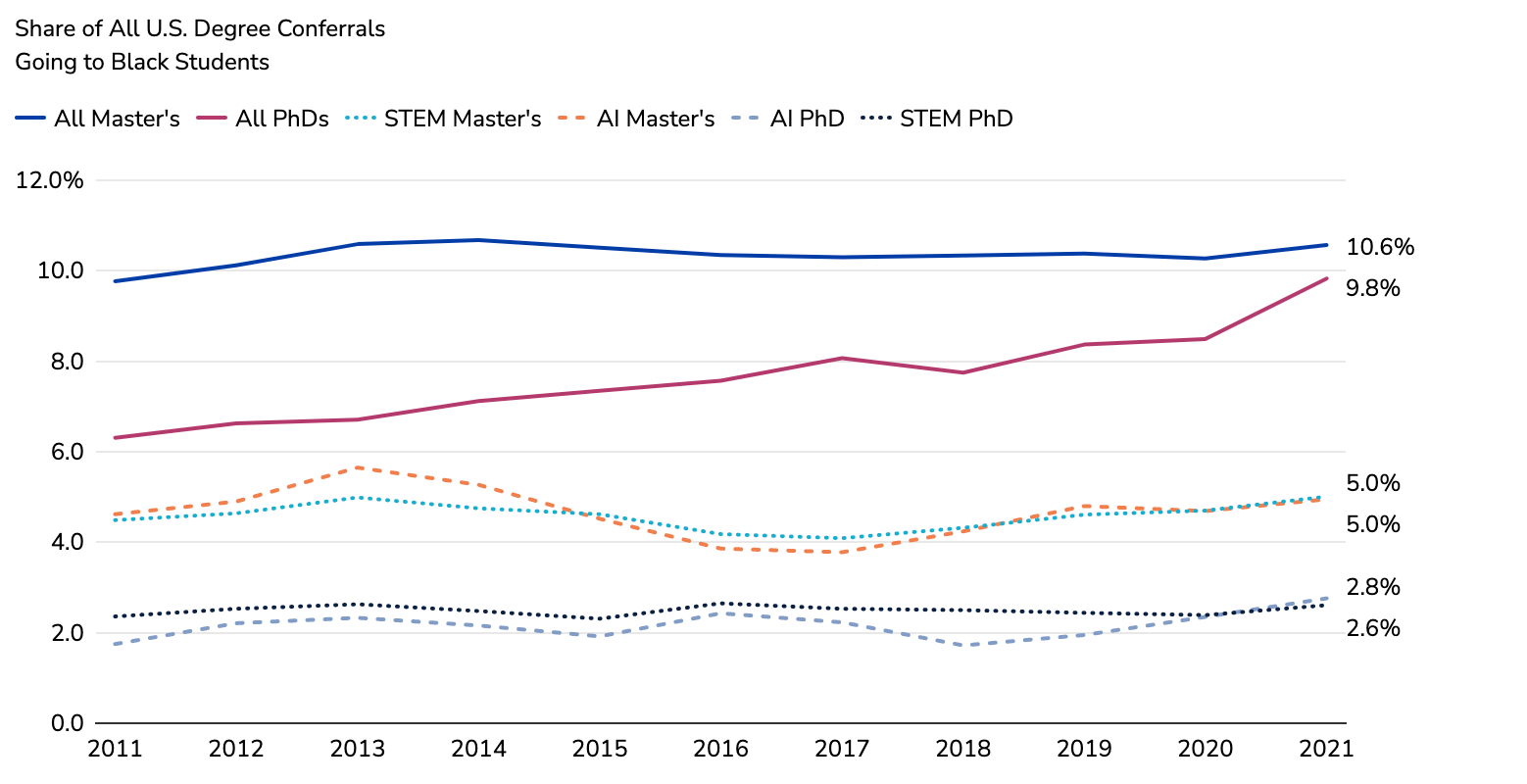
Black students are least represented in AI-related doctoral degrees. However, Black students’ representation in AI-related degrees increased from 2 percent in 2011 to 3 percent in 2021. 76 Black students earned AI-related doctorates in 2011; nearly twice as many Black students, 159, earned AI-related doctorates in 2021.
Takeaways
Black bachelor’s degree conferrals increased in STEM, AI-related fields, and overall between 2011 and 2021. Black bachelor’s degree conferrals grew at the same rate as the overall population across all subjects and in STEM. However, Black students’ AI-related bachelor’s degrees grew slower than the general student population.
Black students are less represented in AI-related fields as educational level rises: they are most represented at the undergraduate level (7.5 percent, a decrease from 2011’s 9 percent), followed by the master’s level (5 percent), and then the PhD level (3 percent). The growth of AI-related graduate degrees for Black students is faster than that of the general student population. Indeed, Black students’ AI-related graduate degree growth is much faster than the general population: AI-related master’s and PhDs for Black students doubled between 2011 and 2021.
Consistent with their representation in AI-related fields, Black students are underrepresented in STEM at the undergraduate level (6.5 percent), master’s level (5 percent), and PhD level (3 percent). Black students are less represented in STEM and AI-related fields than they are across all subjects at the undergraduate level (10 percent of overall undergraduate student graduations), master’s level (11 percent of overall master’s-level student graduations), and PhD level (10 percent of overall PhD-level student graduations). While Black students are underrepresented in graduate education across the board, they have made strides in gaining more ground overall and in STEM fields, and conferral rates for Black students grew faster than the overall student population.
In the next CSET Education snapshot, we will examine the roles of Historically Black Colleges and Universities (HBCUs), Predominantly Black Institutions (PBIs), and other universities in Black students’ postsecondary education. We will also investigate which universities drive Black students’ gains in AI higher education.
- Pew Research Center. “Facts about the U.S. Black Population.” Pew Research Center, 2021, https://www.pewresearch.org/social-trends/fact-sheet/facts-about-the-us-black-population/#:~:text=The%20Black%20population%20of%20the,Black%20Americans%20are%20diverse.
- To read more about national trends in AI, STEM, and all-subject degree conferrals, read the first Data Snapshot in CSET’s Education Series. See Sara Abdulla, “Leading the Charge: A Look at the Top-Producing AI Programs in U.S. Colleges and Universities” (Center for Security and Emerging Technology, March 2023).
- The official NCES Digest statistics estimate that Black students earned over 10 percent of all bachelor’s degrees, based on imputation from “Unknown” responses on the race survey given by post-secondary institutions. In this analysis, we only used raw data files and did not impute “Unknown” or “Mixed-race” responses that did not include “Black” responses.
- We use DHS definitions of STEM majors. See https://www.ice.gov/doclib/sevis/pdf/stemList2022.pdf for the current 2022 list of qualifying majors.
- To read more about Black students and STEM, see EAB. “A third of minority students leave STEM majors. Here’s why.” EAB Daily Briefing, 16 Oct. 2019, https://eab.com/insights/daily-briefing/student-success/a-third-of-minority-students-leave-stem-majors-heres-why/#:~:text=More%20than%20a%20third%20of,29%25%20of%20white%20STEM%20students.
